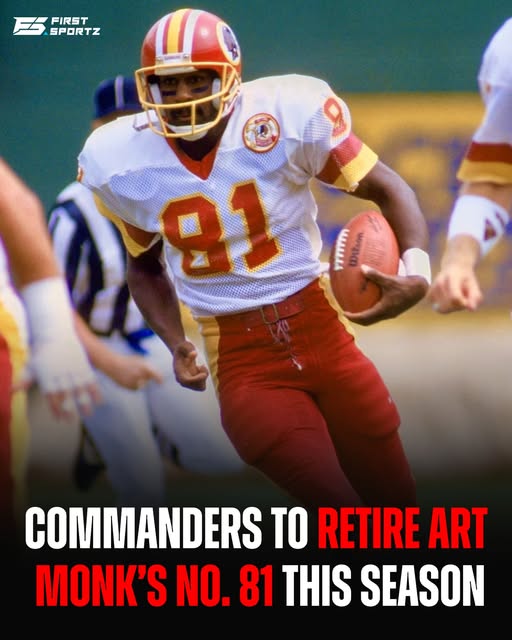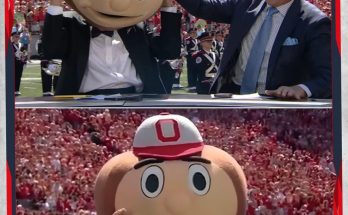In a move that fans have long hoped for and one that cements a legacy already cast in Canton, the Washington Commanders have officially announced they will retire the iconic jersey number 81 in honor of Hall of Fame wide receiver Art Monk. The ceremony is set to take place during the team’s Week 9 matchup, a highly anticipated event that will bring generations of fans and former players together to celebrate one of the most respected and accomplished players in franchise history.
Art Monk’s place in NFL history is undeniable. Over the course of a storied 16-year career, Monk redefined consistency and professionalism at the wide receiver position. Drafted by Washington in the first round of the 1980 NFL Draft out of Syracuse University, Monk quickly made his presence felt, recording 58 receptions for 797 yards in his rookie season—a club record at the time for a first-year player. That performance set the tone for what would become one of the most productive and reliable receiving careers the league has ever seen.
Monk played 14 of his 16 NFL seasons in Washington and was a key figure in one of the most successful eras in franchise history. He was instrumental in helping the team win three Super Bowls during the 1982, 1987, and 1991 seasons. Along the way, he set an NFL record with 106 receptions in 1984—a benchmark that stood as the league standard at the time and underscored his prowess as both a route-runner and a dependable target in clutch moments. Monk’s ability to produce at a high level year after year, regardless of who was under center or what system was in place, made him a cornerstone of the offense for more than a decade.
The number 81 became synonymous with hard work, humility, and excellence. Monk wasn’t flashy. He didn’t seek the limelight, rarely did celebratory dances in the end zone, and was never known for brash statements or trash talk. What he brought to the field was a quiet dominance—let his play speak for itself. And speak it did, loudly and consistently. By the time he retired in 1995, Monk had amassed 940 receptions for 12,721 yards and 68 touchdowns. At the time, he held the record for most career receptions, further emphasizing the historical weight of his career.
Despite these incredible achievements, Monk’s path to the Pro Football Hall of Fame was not without its frustrations. For several years, fans and analysts were baffled by his omission, particularly considering his statistics and role in multiple championship runs. But in 2008, justice was finally served when he was inducted into the Hall of Fame in Canton, Ohio, delivering a characteristically humble and poignant speech that captured the respect and admiration of the football community. His induction was more than a personal achievement—it was a moment of validation for a playing style and ethos that emphasized team over individual.
Now, with the Commanders retiring his jersey number, Monk becomes one of the few elite players in franchise history to receive such an honor. This isn’t merely a ceremonial act; it’s a formal acknowledgment that no other player will wear 81 in burgundy and gold again. It will hang in perpetuity, a lasting tribute to a man who helped define an era.
The announcement has already stirred an emotional reaction among fans and former teammates alike. Former Washington quarterback Doug Williams, who played alongside Monk during the team’s 1987 Super Bowl run, praised the move as “long overdue” and called Monk “the ultimate teammate.” Legendary coach Joe Gibbs, under whom Monk enjoyed most of his success, noted that Monk was “one of the most dependable players I ever coached. He was a warrior who always came through when it mattered most.”
This Week 9 ceremony is expected to be a grand event. While the opponent for that game has drawn interest, all eyes will be on the halftime tribute at FedExField. The team has not yet released the full itinerary of the ceremony, but sources close to the organization have indicated that it will include a video retrospective of Monk’s career, testimonials from former teammates and coaches, and a special address by Monk himself. Family members, Hall of Fame contemporaries, and perhaps some surprise guests are expected to be in attendance. Fans will be able to relive some of Monk’s most iconic plays, from his acrobatic sideline catches to his powerful runs after the catch—moments that helped build not only his reputation but also solidified the identity of Washington football during its most dominant stretch.
What makes this honor particularly meaningful is the symbolic timing. As the Commanders look to build a new era under head coach Dan Quinn and a revamped front office, there is an increased emphasis on reconnecting with the franchise’s rich history. The decision to retire Monk’s number is a clear indication that the organization is seeking to blend its past glory with future aspirations. In honoring Monk, the Commanders aren’t just commemorating a great player—they are re-establishing a cultural foundation rooted in excellence, discipline, and loyalty.
Monk’s legacy extends beyond statistics and victories. He was known as a mentor to younger players, always willing to offer advice, guidance, or just a listening ear. That mentorship continued even after his playing days, as he has been involved in various charitable initiatives and community outreach efforts. Monk’s commitment to faith and service has made him a role model off the field, a man whose humility and integrity mirror his achievements on the gridiron. His post-football endeavors, including co-founding the Good Samaritan Foundation, speak volumes about his character and enduring desire to make a difference in the lives of others.
The impact of retiring a jersey number goes far beyond a banner in the stadium rafters. It sets a standard. It tells every player who walks into the locker room that this number carried weight, not just for what was done on Sundays, but for how that player represented the team every day. Monk carried himself with a grace and dignity that made him beloved by fans, respected by opponents, and admired by his peers.
As the Commanders prepare for this momentous occasion, it serves as a reminder of how powerful the connection between a player and a fanbase can be. In an era where loyalty is increasingly rare, Monk’s career is a testament to staying the course, doing things the right way, and letting your performance speak volumes. For Washington fans, he wasn’t just a wide receiver—he was a symbol of hope, resilience, and excellence. He was a constant in an ever-changing league, and his contributions were pivotal to some of the franchise’s greatest moments.
In the end, the retirement of Art Monk’s jersey number 81 is more than just a ceremony—it is a celebration of everything the game of football can represent at its best. Monk showed that greatness doesn’t always need a spotlight, that leadership can come quietly, and that excellence sustained over time is as valuable as any highlight-reel play. His name, already enshrined in the Hall of Fame, will now be permanently woven into the very fabric of the franchise he helped elevate to the pinnacle of the sport.
And so, on that Sunday in Week 9, when the Commanders take the field and number 81 is lifted into the air for all to see, it won’t just be a jersey being retired. It will be a legacy being honored. A message to past, present, and future players: this is what it means to wear the burgundy and gold. This is what it means to be great. This is Art Monk.
Would you like this formatted for a newsletter, blog, or press release as well?



